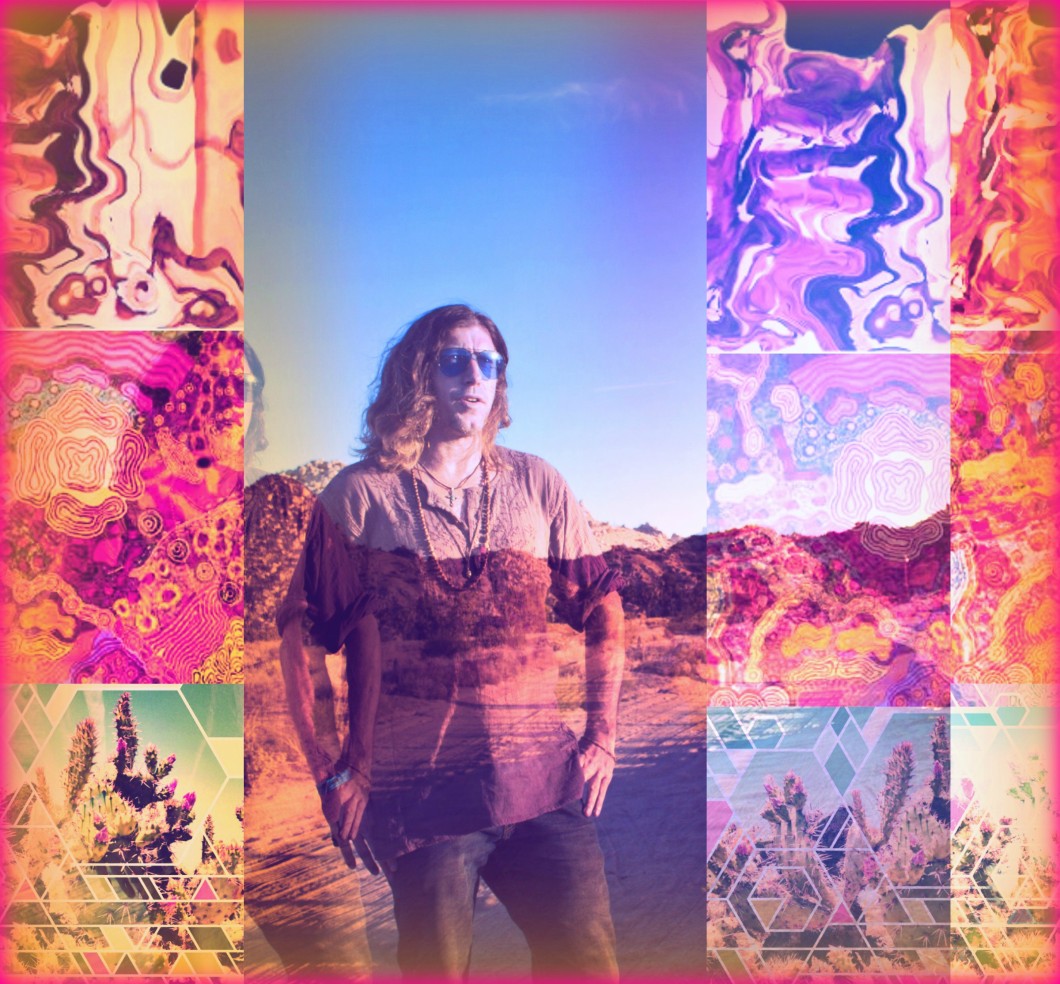
Dave Lacroix: What’s it been like performing and recording music with with Alex Maas of the Black Angels?
Rob Campanella: I’ve only performed a couple of songs with Alex. I’ve known him for over a decade now. He’s a great friend and a wonderful singer and artist. I’ve always loved the song we did together “My Boat Is Sinking,” it was great to play to play that song out in the desert. We haven’t played that song together in 8 or 9 years.
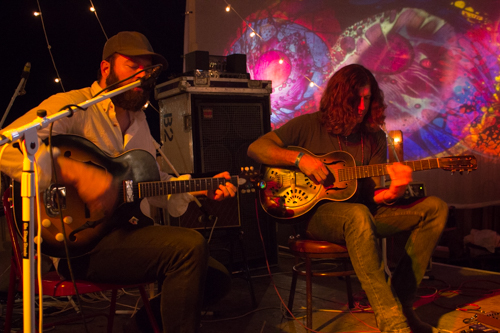
DL: Have you previously played with Alex Maas’ solo project?
Rob Campanella: : When we first recorded that song i actually got up to play with him and the Black Angels a couple of times just right after we did it because it was fresh. That song sat in a can for a few years and then they released it on an EP [Phosgene Nightmare]. So it’s been awhile. I love playing the Dobro too and that’s what I get to play it on.
DL: You’ve been busy producing records recently, like Apple Bonkers with Joel Gion and an upcoming album with the Mystic Braves. How do you balance those two worlds?
Rob Campanella: I think it’s the best thing in the world because I love touring and playing live. When I get sick of that I come home and hopefully have some work in the studio, stay home in the studio and work on some records. When you get stir crazy in the studio you hit the road again. It’s kind of a nice balance back and forth, it makes you appreciate one or the other when you’re doing it.

DL: What has it been like touring with Joel Gion for his album Apple Bonkers?
Rob Campanella: it’s been fantastic. The guys in his band basically recorded the record which is half the Brian Jonestown Massacre. Joel [Gion] and me, Colin [Hegna] and Dan [Allaire] plus Christof [Certik]. To tour with those guys who are some of my best friends on the planet it’s nothing but good times. It’s fun. And plus we’re all really proud of that music cause we helped Joel create it together on the record so it’s fun to go out and play it live.
Are you a big fan of 60’s and 70’s music?
Rob Campanella: That’s a golden era of music but I’m a fan of music from all eras. Christof and I have been doing this acoustic duo thing called Hollywood Nights, which is kind of an inside joke, we’ve been playing old blue grass, 1920s’ ragtime, blues and stuff like that. Our pallet is huge in terms of the type of music we like, all of us in the Jonestown. In fact, the new Joel stuff we’ve been recording has been Tropicallia and Bossanova type stuff. It’s very far afield from psych rock which everyone else is doing. Very different, very cool stuff. But yes, there is something, especially to me, about the late 60’s, early 70’s there was some sort of harmonic convergence in the universe where there was a lot of amazing shit happening. Plus some of the best sounding recordings have came out, and I don’t think they’ve ever topped it with whatever “modern technology,” I don’t think that there’s any better sounding records that have come out than in 68’ through 72’. For some reason, that was the height of great sound.
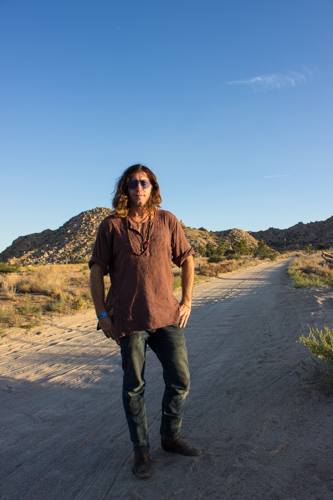
DL: Who are some of your favourite producers from that era?
In terms of producers, Jamie Miller who did the stone’s Beggar’s Banquet and Sticky Fingers. He also did the early Traffic records. Of course there’s George Martin, the late Beatles stuff. A lot of my favourite records were produced by the bands themselves like the first King Crimson record. Tony Visconti was doing cool stuff with Bowie and with T-Rex. Ken Scott who recorded Ziggy Stardust, which is one of the best sounding records in my book. I think more in terms of artists even though I am a producer myself. I do have some other favourite producers from later eras but I don’t really think of producers so much. I just like the records.
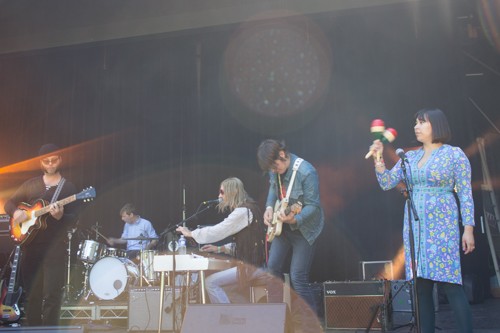
DL: After touring in Europe and North America, are you writing more songs with Joel Gion ?
Joel’s got a bunch of new songs. A lot of them are kind of in this new tropicallia and Bossanova bent. One of them called “Divide” we’ve actually started playing live and that’s been really really fun, I think it’s been surprising a lot of people too. The last whole set of shows we did, we’ve been doing it. Joel is always writing, I’ve got to give the guy credit, he’s always got a new tune in his pocket. When we can, because we all live in different cities, Joel lives in San Francisco, I live in L.A., Colin lives in Portland so lots of times i’ll send files up to Colin, like that song “Divide.” I didn’t have time, so Colin mixed it. Colin and I, definitely when it comes to the Joel stuff, have been working together as co-producers which is kind of fun and nice because he’s one of my best friends, is a super talented musician and a great producer in his own right. He’s got a great studio up there, Revolver Studios, it’s a great space.
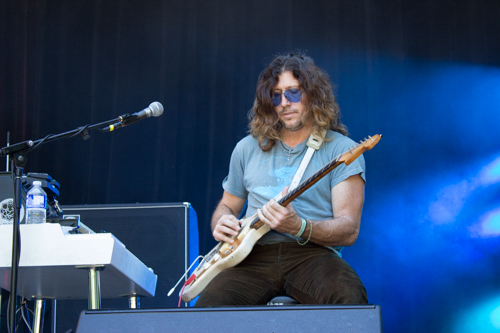
DL: How are your other projects? How about the Quarter After?
Rob Campanella: The Quarter After I would say is really my main band even though it’s been inactive. It has to be with my brother Dominic, it can’t be without him. It’s been dormant for a few years because life took over for him. He’s got a family now and he went back to school and is doing education now. It’s kind of wrestling him out of his semi-music retirement to get back. We played a great show this year with Rain Parade and Gospel Beach, it was our first show in LA in over 3 years. Even then, our band is scattered, our bassist DA has been living in Germany so we actually had to use Tony Malacara from the Mystic Braves as our bass player. We didn’t want to pass up the show and I was recording with the Mystic Braves and I saw what an amazing bass player Tony was. I asked “ dude, do you want to play a show with the Quarter After?” He said “hell ya,” I threw 9 songs at the kid and in two weeks he killed it, it was fun.
DL: Tell us about recording with the Mystic Braves this past spring.
I’m really proud of it and I think they should be proud of it, they really took it to the next level. I liked their first two records a lot, there’s a really unique thing about them, but i think that people are going to be surprised, this is a whole new thing for them. They just wrote really great songs, they are just getting better and better at what they do. And they are good guys, we just kind of went in for the entire month of April that was it, everyday we went in and worked on the record. I’m really happy about it, they allowed me to be a producer, they were like “OK Rob, do what you need to do.” They were really respectful and cool. I think it was a really nice collaboration, I love the album, I think they did a great job. I pushed them pretty hard.

DL: Is quality songwriting rarer these days?
Rob Campanella: Yes. I don’t think think that anyone is paying attention to songwriting, especially in the “psych” scene, or even in the pop scene. Songwriting is kind of a lost art and I think that people, to me, it doesn’t matter what type of music it is, be it psychedelic or modern country or R’n’B or whatever you want to do, a good song is a good song no matter how you dress it up. That’s what made me really happy to work with the Mystic Braves, they came at me with a bunch of great songs so I couldn’t really lose. No matter how you dress them up they are hopefully going to have an impact. Songs are what last a long time. If referring to say, to the Brian Jonestown Massacre, everyone calls them the kings of the psychedelic scene, that they are the godfathers of this neo-psychedelic scene, it’s not because the BJM is a psychedeliac band, it’s because Anton [Newcombe] has written some amazing songs, that’s why people like the band.
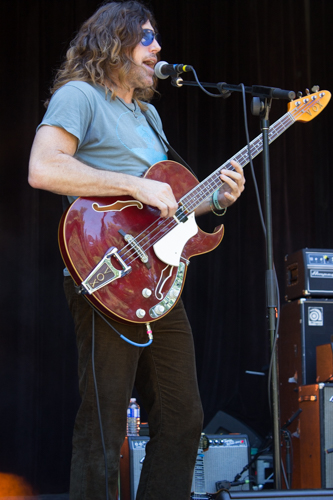
There’s so many different styles that run through the Brian Jonestown, sure they can all be put under this psychedelic umbrella but it’s the songs that are enduring. That’s why the band has endured because he’s a great songwriter first. So people don’t realize that, they think “oh, I get a Vox guitar and a shaggy haircut and wear Beatle boots and i’m in a psych band.” Well, sure yeah, play a D chord for 10 minutes, but write a song over it . That’s what was so refreshing about the Mystic Braves is that they were writing great songs. Like bridges and interesting changes. I kicked their ass in terms of singing and made them sing tons of harmonies that they hadn’t done before which was nice.
DL: Let’s talk about your legacy in the Brian Jonestown Massacre. You have been with the band for a decade and a half.
Rob Campanella: Yeah, 15 years exactly.
DL: You’re a busy guy, what keeps you involved in that project?
Rob Campanella: Well, it’s still fun. When they call, some of my best friends in the world are in that band, so when I get an opportunity to go play music in a great place like Australia or Europe it’s really great. Anton is always coming up with something that’s a challenge. We’re always learning new songs every tour which is kind of cool. I think that this last tour we did was probably musically the most satisfying tours i’ve ever played with him because there was a lot of cool new stuff and old stuff we’ve never played. That’s the thing, there’s this treasure trove of a back catelogue of songs we’ve never even played live before. It can still stay exciting even for a band that’s 20 years old.
DL: The Austin Psych Fest/Levitation festival virtually doubled over the last year. Do you feel that this is some over due attention towards the psych scene?
Rob Campanella: I think it’s great, it’s good for everybody. It gives people a chance to make music like this for a living instead of getting a day job and barely squeaking by. I also like the fact that it’s not electronic dance music, there’s not a bunch of laptops everywhere, it’s people with real instruments and real drums and I think that’s important. To me songs are still paramount, and however you play a song is fine, but obviously we like seeing live music with real instruments on stage. It’s great that a festival in this day and age can get bigger when it’s just people playing instruments. There’s a lot of kids in America and the world today and they don’t want to see live bands at all, there’s those EDM festivals that are huge, with hundreds of thousands of people and there’s just a dude onstage with a laptop. That’s fine if you are into that but it’s a bit of a shame that those kids are missing out on what we know is a real rock show with mistakes and energy and four, five or six people feeding off each other and making something special in a moment instead of some guy hitting the spacebar on a laptop.
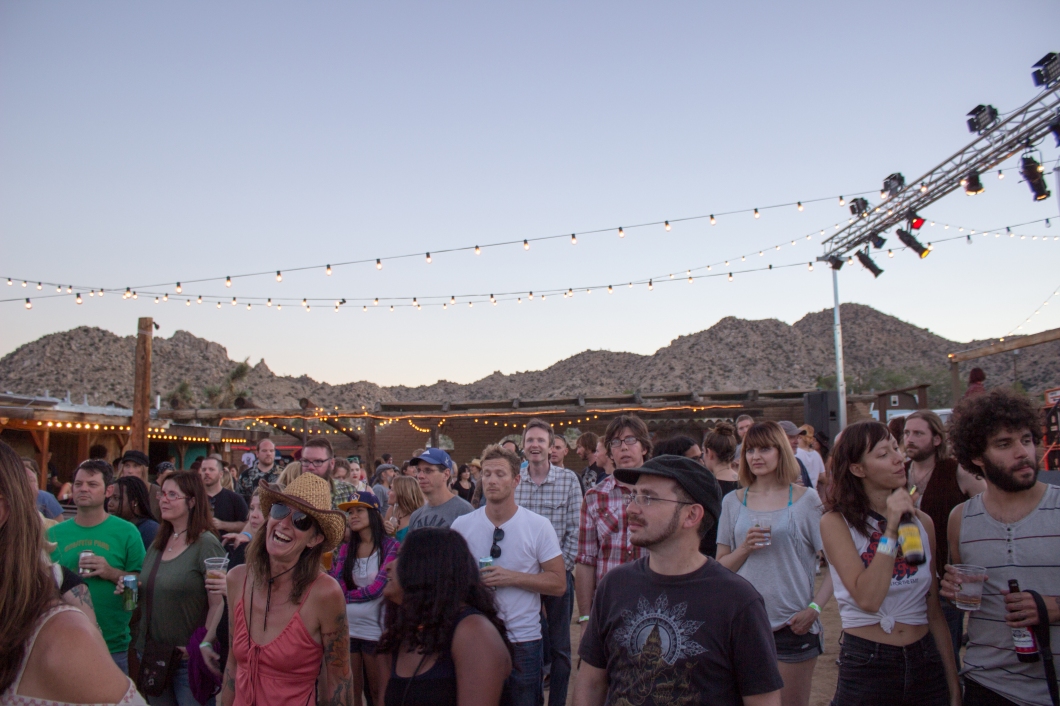
DL: How do you feel about the rise of smaller, focused festivals, like Desert Stars?
Rob Campanella: I like these ones better myself because they are less hectic and they are more down-home. You can hang out with people, there is less security, you don’t feel like the man is beating down on you. Even Psych Fest or Levitation still has that homegrown feel. I kind of like a little bit of un-organization that goes with these things, it’s kind of the seat of the pants. With the BJM, we’ve played so many of these big huge corporate festivals like T in the Park, Oxygen or Glastonbury. They are kind of ehhhhh… they are these big machines that are really faceless. There are so many people, you are lost in the crowd. Festivals like Desert Stars are beautiful.
[…] “On the Lost Art of Songwriting” – An Interview with Rob Campanella of the Brian J… […]
great!